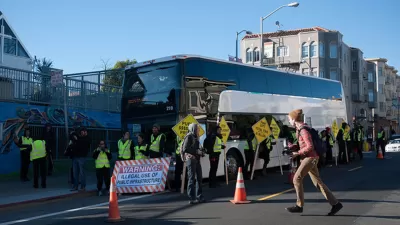Yes—that's right: fervent opponents of Google (et.al) buses tried to use California's environmental law to get them off the streets of San Francisco—which would lead to tech employees driving their own vehicles to Silicon Valley.
"The appeal, which opponents filed in February, said the city did not properly examine and evaluate potential environmental impacts to the city from the buses, which carry employees from San Francisco to tech campuses on the Peninsula," writes Ellen Huet on the legendary clash between the city's tech community and gentrification opponents centered on the iconic buses.
The use of the landmark, 1970 environmental law brought a new twist to the controversy as opponents have been widely known for taking their opposition to the streets (also see "Gmuni dancers" blocking a Google Bus in admirable formation clad in appropriate Chrome colors).
On Tuesday, April 01, the Board of Supervisors voted 8-2 to reject the appeal after more than six hours of debate. See page 10 of agenda [PDF] and Joshua Sabatini's excellent recount of the meeting in The Examiner.
CEQA was used by opponents to delay the Board of Supervisors' approval of the pilot shuttle bus program, whereby the private shuttles would pay a fee for access to MUNI bus stops for 18 months commencing July, in a similar vein that a small group of bicycle opponents successfully used CEQA in 2006 to stall the approval of the city's bicycle plan for five years. It remains to be seen if Richard Drury, the lawyer representing the appellants, takes the appeal to court.
Environmentalists and union representatives said the city planning department should not have exempted the program from reviews under the California Environmental Quality Act. They say environmental effects - which could include damage to roads, traffic congestion, emissions and resident displacement in neighborhoods near stops - were not studied before the bus program was allowed to begin.
Proponents of the buses say they keep thousands of cars off the road and that the program will help the city regulate them. One oft-cited UC Berkeley study that surveyed 130 regional shuttle riders showed almost half would drive to work alone from San Francisco if they couldn't ride a bus.
Last week The Examiner reported on a survey commissioned by the Bay Area Council, a major shuttle booster, showing wide support for the private shuttles, often referred to as Google Buses though the pilot program also applies to intra-city shuttles such as those used by University of California at San Francisco. The 'tech shuttles' are considerably larger than those used by UCSF.
A poll of 500 likely voters in San Francisco found 79 percent of participants believed tech’s growth has been good for The City, though activists criticize the industry for displacing longtime residents.
Last word goes to Sarah Jones, director of environmental planning at the planning department. "We do very much understand that the shuttles are creating inconveniences for Muni riders. These inconveniences do not rise to such a level that doing a review for the shuttles is necessary."
FULL STORY: Appeal targeting S.F. tech shuttles shot down

Maui's Vacation Rental Debate Turns Ugly
Verbal attacks, misinformation campaigns and fistfights plague a high-stakes debate to convert thousands of vacation rentals into long-term housing.

Planetizen Federal Action Tracker
A weekly monitor of how Trump’s orders and actions are impacting planners and planning in America.

In Urban Planning, AI Prompting Could be the New Design Thinking
Creativity has long been key to great urban design. What if we see AI as our new creative partner?

King County Supportive Housing Program Offers Hope for Unhoused Residents
The county is taking a ‘Housing First’ approach that prioritizes getting people into housing, then offering wraparound supportive services.

Researchers Use AI to Get Clearer Picture of US Housing
Analysts are using artificial intelligence to supercharge their research by allowing them to comb through data faster. Though these AI tools can be error prone, they save time and housing researchers are optimistic about the future.

Making Shared Micromobility More Inclusive
Cities and shared mobility system operators can do more to include people with disabilities in planning and operations, per a new report.
Urban Design for Planners 1: Software Tools
This six-course series explores essential urban design concepts using open source software and equips planners with the tools they need to participate fully in the urban design process.
Planning for Universal Design
Learn the tools for implementing Universal Design in planning regulations.
planning NEXT
Appalachian Highlands Housing Partners
Mpact (founded as Rail~Volution)
City of Camden Redevelopment Agency
City of Astoria
City of Portland
City of Laramie



























